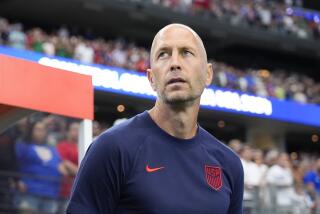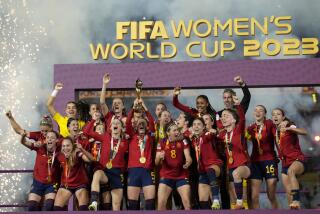Bitter Endings
- Share via
FUKUI, Japan — Once again, it is England against Argentina in the World Cup, four years removed from the nervous breakdown at St. Etienne, where one English icon was born, where another was nearly ruined, where two controversial referee decisions threatened to undermine 120 minutes of contents-under-pressure soccer, where one of the greatest World Cup games played ended in limp predictability--England going out on penalties.
Has it already been four years? The English, who still haven’t fully recovered from their first World Cup loss to Argentina in 1986, will argue that they need more time, because David Beckham’s broken foot might have healed, but what about those millions of broken hearts?
Once again, England appears to be up against it. Argentina looked fast and formidable in its World Cup-opening victory over Nigeria last weekend while England unraveled against Sweden just as quickly as Beckham, making his first appearance since breaking his foot in mid-April, ran out of gas somewhere around the 40-minute mark.
England held on for a 1-1 tie, barely, saved twice in the second half by its aging goalkeeper, David Seaman. Now, a point in the World Cup is a point in the World Cup, unless you’re England and your next game is against Argentina and your best player might not have the lungs to last much more than a half and your once-reliable defense is now faced with questions it might not be able to answer.
On the bright side, England has dealt with worse. Amid caldron conditions on the night of June 30, 1998 in St. Etienne, France, England and Argentina had their tense second-round struggle--tied at 2-2--interrupted in the 47th minute when the Argentines’ cagey captain, Diego Simeone, goaded Beckham into a retaliatory red card.
After the teams had exchanged first-half penalty kicks, after England’s Michael Owen had scored the goal that changed his life, after Argentina equalized just before the break on a slick bit of free-kick trickery, after fans of both countries had settled in to see if the second half could somehow maintain the pace of the first, there came the halting thud.
Simeone, sensing that World Cup rookie Beckham could be had, hounded the young midfielder throughout the first half and opened the second by fouling him from behind, knocking him to the ground and appearing to step on Beckham as he walked away from the collision.
Just as Simeone wanted, Beckham lost it. Sort of. Still on the ground, Beckham flicked his foot at Simeone, knocking the back of Simeone’s leg. Not a smart maneuver, but not the kind of thing that gets a key midfielder ejected from a round-of-16 game in the World Cup.
Danish referee Kim Milton Nielsen, hovering over Beckham, disagreed. Out came the red card, out went Beckham.
Down to 10 men against Gabriel Batistuta, Claudio Lopez and Co., England seemed destined to quickly follow suit.
Suddenly, it was 1986 all over again. The England-Argentina soccer rivalry, emerging from the emotional fallout of the Falklands War, is really only a two-part drama--a World Cup quarterfinal in Mexico in 1986, followed by the rematch in France 12 years later. But about that first act: It featured both the most famous goal in the history of the World Cup--FIFA recently named it the tournament’s greatest goal--and the most infamous, both engineered by Argentina’s Machiavellian midfielder, Maradona.
The match was scoreless in the 55th minute when Maradona and English goalkeeper Peter Shilton went up for an aerial ball. Shilton was taller and appeared to have a bead on the ball, but Maradona succeeded in revolutionizing the sport, if only for a fleeting moment: He punched the ball, spiking it like a volleyball, away from Shilton and into the net.
This is a violation of the soccer rule book, traditionally speaking. Except Ali Ben Nasser, the Tunisian referee, did not have a clear view of the play and did nothing to disallow it.
The goal stood, despite England’s vehement protestations. Replays--and English fans have seen thousands of them since, mostly in their nightmares--show Maradona indeed cheated to score. But after the match, when asked about the goal, Maradona smirked and cheekily attributed it to “the hand of God.”
There was nothing illegal about Maradona’s second goal four minutes later, a half-field dance-and-shimmy through four English defenders and past Shilton for what proved to be the game-winner.
In four minutes, 114,580 fans inside Azteca Stadium had seen Maradona at his absolute worst and his absolute best.
In four minutes, England was headed out the tournament, bound for a galling 2-1 defeat.
Twelve years later, the English had come to St. Etienne intent on revenge--and were angling in the right direction, following the 18-year-old Owen’s dazzling burst through the Argentine defense and full-sprint strike. Halftime accounting showed some kind of haul: three halves of Argentina-England World Cup soccer, three of the most memorable World Cup goals ever scored.
But two minutes into the second half, England was down to 10 men. Revenge quickly moved to the backburner. Inside Stade Geoffroy Guichard, nine English defenders dug in their heels in front of Seaman’s net. Inside pubs across England, millions of English supporters swallowed hard and covered their faces.
For 73 minutes--the last 43 of regulation plus 30 in overtime--England refused to yield. It was a remarkable display of defense, England blunting attack after attack. England might have won it too, in the 81st minute, but fullback Sol Campbell had his headed goal disallowed when Nielsen cited English captain Alan Shearer for pressing his elbow against the head of Argentina goalkeeper Carlos Roa.
It was still 2-2 when the overtime whistle blew. All of England knew what that meant--penalty kicks--and winced. In 1990, in their best showing since their lone World Cup championship in 1966, the English were eliminated in the semifinals in a penalty-kick shootout against West Germany.
History would soon repeat, with Paul Ince and David Batty failing in their attempts and Argentina winning the shootout, 4-3.
That was four years ago. Since then, Owen ratcheted up his reputation from promising fledgling to 2001 European player of the year.
Beckham, vilified in England for his red card, has steadily remade his image through a series of championships with Manchester United and game-saving free kicks for England. He is now England’s captain and undisputed on-the-field leader, which was the reason for the national hysteria when Beckham had his foot broken during an April club match against Deportivo La Coruna.
The player whose two-footed tackle took down Beckham, Aldo Duscher, is from Argentina.
England meets Argentina again Friday in a Group F match in Sapporo. The English lack a number of things--momentum, a fully fit Beckham, a fully confident back line--but incentive isn’t one of them.
*
(BEGIN TEXT OF INFOBOX)
No Love Lost
The conflict between England and Argentina on the soccer field has origins earlier than the Falklands War:
1966--In a World Cup quarterfinal in England featuring a level of brutality that was new to the sport, referee Rudolf Kreitlein tired of the complaints of Antonio Rattin and sent off the Argentine captain. After eight minutes of dissent, Rattin finally left the field. England won, 1-0, and went on to win its only Cup. England Coach Alf Ramsey later referred to the Argentine players as “animals,” an act still remembered in South America.
1986--Again in a quarterfinal, Argentina prevailed, 2-1, on two goals by Diego Maradona. The second is considered one of the finest individual efforts in World Cup history, but the first is one of the most infamous. Photographs clearly showed Maradona punching the ball over goalkeeper Peter Shilton with his fist; later, he described the goal as part Maradona, part “the hand of God.”






